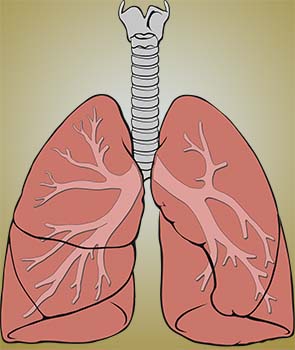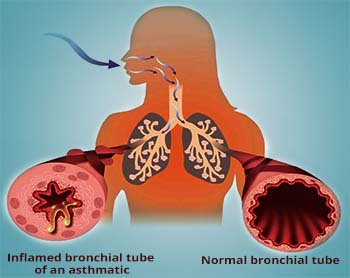The word "asthma" is derived from Greek meaning "panting" or "labored breathing".
Asthma is an inflammatory disorder of the airways that is characterized by increased responsiveness of the tracheo-bronchial tree to various stimuli resulting in widespread spasmodic narrowing of the airways.
The normal mechanism of our respiratory system is as follows:

Human body requires oxygen to breathe which is provided by lungs. With every breath, air travels to the lungs through a series of tubes and airways. Air inhaled from the nose reaches lungs through the wind pipe (trachea); the wind pipe is divided into left and right bronchi that enters both the lungs, which further divide into the bronchioles (sub-branches of the bronchus) and end up to form the alveoli (air sacs).
There are around 300 million air sacs in the lungs whose main function is to send pure oxygen in the blood circulation and receive carbon dioxide which can be released during exhalation.
Lungs are among the most important organs of the body that help to provide us with life's most essential component, oxygen in its purest form. Lungs expand and contract 20 times in one minute to supply oxygen to the body. Inside the lungs exchange of oxygen and carbon dioxide takes place through alveolar walls and into the blood in the capillaries which promotes normal breathing.
Asthma affects the airways in 3 ways:
- Spasms
- Edema
- Clogging because of mucus accumulation

In asthma, the exact mechanism is unknown but it occurs due to the immune response of bronchial airways. The immune system releases chemicals which produce inflammation of mucous membranes of the bronchial tubes and bronchioles which prevents the entry of oxygen from reaching the alveoli and ultimately increases the body's demand for oxygen.
The smooth muscles of the airways gets constricted and narrows the air passages causing increased secretion of mucus thereby leading to difficulty in breathing , chest tightness, wheezing and cough.
Homeopathy offers positive results in the form of carefully selected, dynamized remedies that not only take care of the symptoms, but also remove the disease right from its roots.















